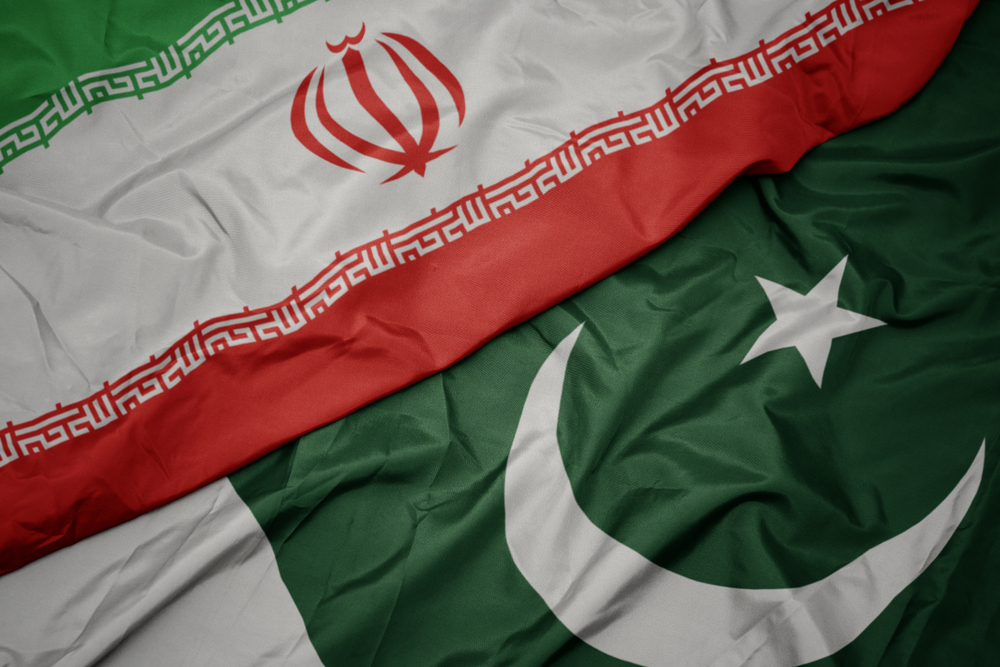The main objectives of enhancing cooperation between Iran and Pakistan, as reflected in the visit of the Pakistani Chief of Army Staff, Asim Munir, to Tehran on July 15th and 16th, include expanding the scope of security coordination along the shared borders, elevating the level of economic relations, consulting on developments in the Afghan file, especially after the Taliban’s rise to power, and being vigilant about potential paths of the Pakistani Shia militia group “Zainabiyoun.”
The significance of the visit of the Pakistani Chief of Army Staff, Asim Munir, to Tehran on July 15th and 16th, can be attributed to three main considerations:
Firstly, the timing of the visit is crucial as both Iran and Pakistan are facing escalating threats from opposition groups. These groups have been targeting border guard forces, police, and the Islamic Revolutionary Guard Corps, making it imperative for both nations to address these security challenges together.
Secondly, the visit reflects the shared goal of both parties to shift the focus of managing their shared border from a purely security-oriented approach to an economic one. This transformation aims to create an economic gateway that will not only strengthen bilateral relations but also foster economic cooperation between Iran and Pakistan.
Thirdly, the visit coincides with various questions regarding issues of mutual interest. These include the stance towards the Afghan Taliban movement and the Pakistani Shia group “Zainabiyoun,” which Iran formed to engage in the Syrian conflict. Addressing these concerns together during the visit demonstrates the commitment of both nations to engage in constructive dialogue and find common ground on matters of regional significance.
Multiple Objectives
Iran’s interest in the visit of the Pakistani Chief of Army Staff was evident in the busy schedule of meetings in Tehran. He met with President Ibrahim Raisi, Chief of the Iranian Army Abdulrahim Musavi, Chief of Staff Mohammad Bagheri, Islamic Revolutionary Guard Corps Commander Hossein Salami, and Foreign Minister Hossein Amir-Abdollahian. It can be said that Iran and Pakistan sought, through the visit, to achieve multiple objectives, the most prominent of which are:
- Enhancing Security Coordination on the Borders: This is a matter of utmost concern for Iran, as it has experienced multiple operations by armed opposition groups utilizing regions inhabited by Baloch ethnic groups along the borders with Pakistan as launching points to target border guard forces and the Islamic Revolutionary Guard Corps. For example, on May 31st of last year, clashes erupted between Iranian border guards and an armed group in the Saravan region of Sistan and Baluchestan province, resulting in the tragic death of six border guard personnel.
These persistent confrontations have, at times, strained Iran-Pakistan relations, leading to accusations from Iran that Pakistani authorities have turned a blind eye to some of these operations. Previously, on February 28th, 2019, the Iranian Chief of Staff, Mohammad Bagheri, even issued threats of military intervention in Pakistan to pursue the armed groups responsible for these actions.
However, it appears that Iran has shifted its stance and is now actively seeking high-level security coordination with Pakistan to diminish the capabilities of these groups and prevent them from exploiting the borders for their operations. This marks a notable change in Iran’s approach.
Moreover, Pakistan also recognizes the necessity of such cooperation, particularly due to the fact that certain elements of Pakistani Baloch opposition groups have relocated to the same region with the intention of targeting Pakistani forces. This was evident in the attack on April 1st of the previous year, which tragically resulted in the death of four Pakistani personnel
Both Iran and Pakistan now face a common challenge and share an interest in addressing these security threats along their borders collaboratively.
- Consultation on the Afghan Issue: The matter of Afghanistan has been a longstanding point of contention between Iran and Pakistan, with Iran accusing Pakistan of supporting the Afghan Taliban movement. This disagreement escalated during the Taliban’s rule in the mid-1990s.
However, there has been a notable shift in Iran’s security approach following the Taliban’s return to power in Kabul in mid-August 2021. This change appears to have brought the perspectives of both parties closer together. Iran has shown a willingness to establish communication channels with the Taliban and avoid confrontations that could further escalate tensions. Moreover, Iran has encouraged the Taliban to prevent the “ISIS-Khorasan” organization from targeting Iranian interests.
These developments signify a potential turning point in Iran-Pakistan relations regarding the Afghan issue, with both countries seeking to find common ground and collaborate on regional security concerns.
On September 12, 2021, Iran took part in a meeting hosted by Pakistan after the Taliban’s takeover of Kabul. The meeting brought together intelligence chiefs from eight countries, including Iran, Pakistan, China, Russia, Tajikistan, Kazakhstan, Turkmenistan, and Uzbekistan. The primary outcome of the meeting was an agreement among the participants regarding the importance of establishing communication channels with the Taliban. The purpose of these channels is to facilitate discussions on matters of mutual interest, with a particular focus on countering the activities of the “ISIS” organization in the region.
- Expanding the Scope of Economic Relations: Security cooperation serves as a catalyst for the priority shared by both Tehran and Islamabad – expanding the scope of economic relations. A noteworthy development in this regard was the convening of the Joint Consular Committee between Iran and Pakistan in Tehran on July 17th of the current year. This meeting marked the committee’s reestablishment after an eight-year hiatus.
During the committee meeting, productive discussions took place, focusing on various issues. These included streamlining visa issuances, addressing challenges faced by students and transit drivers from both countries, and resolving matters related to the impoundment of boats and other related concerns. The renewed engagement in the Joint Consular Committee highlights the commitment of both Iran and Pakistan to strengthen economic ties and foster greater cooperation for mutual benefits.
A significant step in enhancing economic cooperation between Iran and Pakistan was the inauguration of a border market in the village of Pishin, situated on the borders between the two countries. Iranian President Ebrahim Raisi and Pakistani Prime Minister Shahbaz Sharif jointly conducted the inauguration on May 18th of the previous year. This border market represents the first of six markets planned to be opened along the border, in accordance with an agreement signed between the two nations in 2012.
Moreover, during the same event, President Raisi and Prime Minister Sharif also inaugurated the Iran-Pakistan electricity transmission line. This transmission line is designed to supply electricity to some remote regions in Pakistan. The energy file holds particular significance for Pakistan as it aims to strengthen its relations with Iran to increase Iranian gas and oil exports to Pakistan.
During the meeting between President Raisi and the Pakistani Chief of Army Staff, it was particularly noteworthy that Iran’s focus was on giving an economic character to the management of the border file with Pakistan. President Raisi emphasized Iran’s strategy, stating, “Iran’s strategy is to transform the security borders into secure economic borders.” He further stressed the importance of accelerating the implementation of bilateral agreements between Iran and Pakistan, as this would lead to significant expansion in economic, trade, and political cooperation between the two countries.
On March 5th of the previous year, Mohammad Sadegh Ganadzadeh, the Director-General for the Indian Subcontinent at the Iran Trade Development Organization, announced Iran’s plans to increase the level of trade exchange with Pakistan to 5 billion dollars, a substantial increase from the current figure of one and a half billion dollars.
Furthermore, both Iran and Pakistan expressed a mutual intention to avoid any competition between the Iranian port of Chabahar and the Pakistani port of Gwadar. Pakistani Finance Minister, Miftah Ismail, welcomed Iranian investments in the Gwadar port, underscoring the spirit of cooperation and collaboration between the two countries.
- The Future of the Shia Militia “Zainabiyoun”: Pakistan’s growing concern revolves around the potential actions of Shia militias, particularly the Pakistani “Zainabiyoun” Brigade, which were formed and trained by Iran to participate in the Syrian conflict alongside regime forces. With the Syrian regime now controlling the majority of Syrian territories, questions have arisen regarding the future trajectory of these militias. One option being considered is their return to their home countries, a proposition firmly rejected by Pakistan due to the perceived security implications. Pakistan fears that these militias, being loyal to Iran, could pose a direct threat to its security stability if they were to return.
To address this concern, Pakistan views continued security cooperation and stronger economic relations with Iran as crucial incentives to dissuade Iran from implementing the option of bringing the militias back. Pakistan recognizes that such a move could potentially lead to “latent” disagreements on various other issues, including security cooperation between Iran and India.
The Impact of Geography
In conclusion, geographical proximity continues to be a fundamental factor influencing the direction of Iran-Pakistan relations. While past tensions have marked their relationship, it is now evident that both countries recognize the importance of establishing a new phase of cooperation across various levels, particularly in the areas of security and economy.


